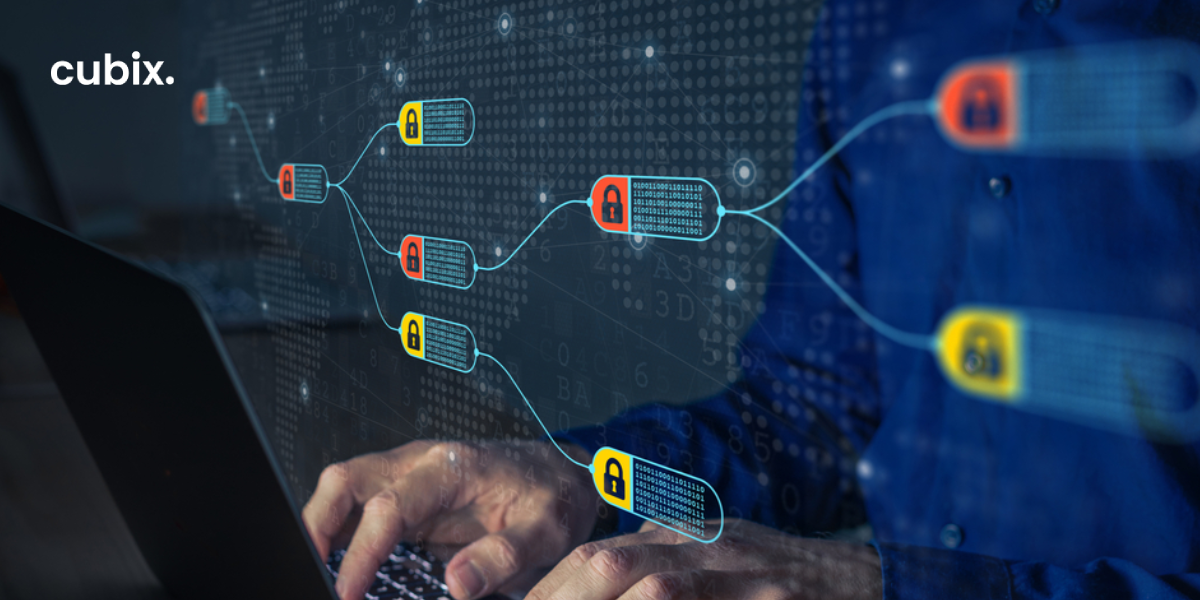From being the moderator of all things crypto to becoming a prevalent part of the business world, blockchain has evolved far beyond its initial relation with cryptocurrency. The integration of this technology within various industries and enterprises can lead to sustainable business success in the digital age.
By enhancing prevalent factors, including data traceability, transparency, trust, and security, blockchain has become a mainstay of the business world. As a result, the global spending on this technology is forecasted (by Insider intelligence) to reach a staggering $19 billion by 2024. .
It's no wonder why numerous global businesses are looking to transform their organizational practices with blockchain development, which seamlessly solves multiple business problems while also providing new avenues for digital companies.
But What Business Problems Does Blockchain Solve?
Supply Chains
Blockchain technology facilitates the enhancement of supply chains with transparent transactions and improved security, which are integral in documenting the supply chain journey. These factors result in further improvements within the areas of asset tracking, linking, recording, and sharing.
UPS is credited with creating a blockchain-based platform called Inxeption Zippy which secures and streamlines their supply chain for B2B transactions. The result is increased trade volumes along with the elimination of unethical and illegal practices from supply chains on a global scale.
Data Security
Storing sensitive data through blockchain can enhance data security as the data won't be susceptible to tampering and theft. This is because distributed blockchain data storage provides enhanced speed and safety as compared to a centralized database.
Data privacy issues are further resolved through smart contracts, immutability, and transparency, further strengthening the business’s data security. Santander’s partnership with Ripple to create “One Pay FX” shows how blockchain is enabling secure international transfers in global banking.
Intellectual Property
Blockchain has made significant waves in the fight against piracy, as seen in the efforts of Binded, which allows artists to copyright their original content by saving it on the blockchain. Businesses can utilize this technology by creating a digital trail of their records regarding innovation processes and digital products.
Businesses can further acquire blockchain certificates, which can be used to trace the ownership of all original work and store copyright dates in the block’s data, providing direct access to the original owner.
New Avenues of Blockchain In Business
With several prevailing factors showcasing the importance of blockchain in everyday business, there are also new avenues that present ample opportunities for this technology. These are identity verification and asset management, both of which will be built upon as follows:
Identity Verification
Personnel verification is an endeavor that businesses seek to optimize for the better. Securing sensitive information benefits the company and its employees by diminishing the need for repetitive verification processes. However, sharing sensitive data across multiple parties can compromise privacy.
Current digital identity management systems are also vulnerable to data breaches and don’t provide substantial control over user data.
How Businesses Can Use Blockchain For Identity Verification
Integrating blockchain with identity verification can allow businesses to grant access to verified channels through the use of encrypted keys. This ensures that only authorized personnel can access sensitive technological and individual resources.
Blockchain can further enhance this process through quicker verification, enhanced data security and creating an auditable trace of records, all of which can reduce the costs surrounding identity verification, facilitate data compliance, and effectively mitigate the risk of identity fraud.
These factors lead to the following applications of blockchain in identity verification.
Asset Management
All business owners seek greater transparency and insight regarding asset management to gain more control and visibility over the process. Without these factors, tracking assets and digital transactions across an organization will become a daunting task.
Furthermore, the lack of quick acquisition and transference of asset ownership stands as a prevalent roadblock for numerous businesses in today’s digital age.
How Businesses Can Use Blockchain For Asset Management
Integrating blockchain technology can completely revamp asset management as we know it. With tokenization, physical assets can be converted into digital tokens that are then stored and transferred digitally using the blockchain with just the click of a button.
High-value assets such as intellectual property rights can be secured through tokenization, which enables fractional ownership, increased liquidity, and greater accessibility for investors, all of which is facilitated by the enhanced efficiency, speed, and security of blockchain technology.
These factors lead to the following applications of blockchain in asset management.
Blockchain For A Better Future
In today's dynamic business world, blockchain technology provides ironclad security and crystal-clear transparency, allowing valuable data to be handled and protected in an innovative manner, effectively reducing the pitfalls faced in traditional business methods.
But that’s just the tip of the iceberg, as novel blockchain applications will soon enter every crook and cranny of future business endeavors. With that arises the need for a reputable blockchain development company to take your business to the next level.
This miracle solution is right at your fingertips in the form of Cubix; contact us today and experience the next generation of development expertise that can not only develop the solutions you need but can provide that touch of novelty that can boost your business in this tech-riddled business landscape!

